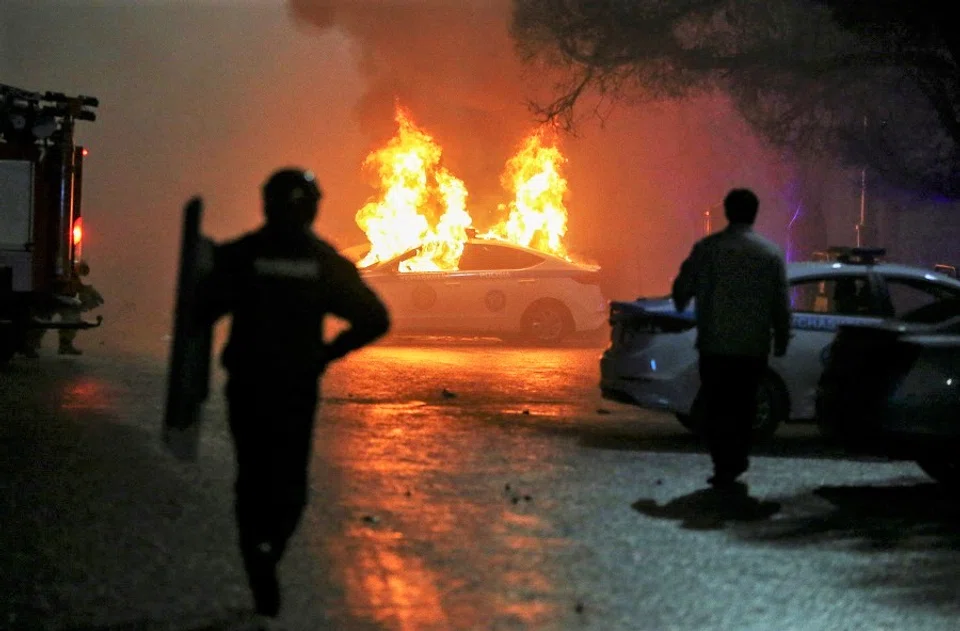US, Russia and China using Kazakhstan unrest as a proxy
China and Russia have been quick to point to external hands, namely the US's, in stoking recent unrest in Kazakhstan. But the main issue is not so much what precipitated the unrest, but how it has been expedient for major players US, Russia and China to capitalise on it for geopolitical gain. Zhang Chi analyses the situation.

Massive protests broke out across Kazakhstan on 2 January, drawing global attention. This is the worst unrest since the former Soviet republic gained independence 30 years ago.
The protests were precipitated by the government's decision to lift the price caps on liquefied petroleum gas (LPG), raising prices from 60 tenge (US$0.14) to 120 tenge per litre. Even though the Mangistau government took action to bring prices down to 50 tenge per litre, lower than what they were before the protests, the situation continued to escalate.
Since 3 January, independent media has been encouraging people to participate in street protests, and what were economic demands and protests against rising LPG prices began turning into political demands seeking better citizen welfare and political reform.
On 5 January, armed men with automatic weapons appeared, and organised groups, protesters, and looters formed a chaotic morass. The Kazakhstan government cut internet access and announced a state of emergency and nationwide curfew. The Cabinet also resigned en masse. Almaty's international airport was temporarily seized as a result of the protests and local government buildings in major cities were either briefly occupied or set fire to.
On 6 January, Kazakhstan's President Kassym-Jomart Tokayev sought help from the Russia-led Collective Security Treaty Organization (CSTO), which later sent 3,000 peacekeeping troops to Kazakhstan. The CSTO grew out of a Collective Security Treaty signed between states of the Commonwealth of Independent States (CIS) and is a regional military alliance known as a "mini-NATO" whose main members include Russia, Kazakhstan, Belarus and others. During the 2010 South Kyrgyzstan ethnic clashes and the 2020 Armenian-Azerbaijani clashes, the CSTO hardly responded. But the organisation's swift response this time round clearly highlights its "presence" in maintaining regional stability.

Kazakhstan and China share a 1,782.75 kilometre-long border. Many Kazakhs have relations in Xinjiang, while the Uighur population in Kazakhstan stands at an estimated 278,869 people. Thus, the impact of Kazakhstan's situation on China is obvious. Following the unrest, Chinese leaders and Chinese state media immediately labelled it as a "colour revolution", demonstrating China's close watch on the situation in Kazakhstan.
Insinuations of an external invisible hand behind the unrest
Russian state media and the Kazakhstan government both alleged that "foreign-trained terrorist gangs" were behind the unrest. The characterisation of the protests by China, Russia and Kazakhstan shows that while the situation is temporarily under control, authorities and neighbouring countries remain highly vigilant against the spread of anti-government activities, the chain reaction that it may trigger, and the effects of the unrest on neighbouring countries.
Calling the violent repression of unrests in Kazakhstan a reckless expansion of anti-terrorism that disregarded human rights, the US took the moral high ground and shifted the public's attention away from the Ukraine issue.

Kazakhstan's rush to "create" evidence before firm evidence is found has drawn flak from Western media. On 9 January, Kazakhstan's state television Qazaqstan aired a "confession" video of a Kyrgyz jazz musician who "admitted" that someone had offered him 90,000 tenge to participate in a demonstration. After he returned to Kyrgyzstan, he told the media that the people filming the video said that he would be released from custody and deported immediately if he admitted to taking money to participate in the protests. This video drew the ire of many musicians and the Kyrgyz people, which led to a protest in front of the Kazakhstan embassy in Bishkek.
While there is no evidence of clandestine forces orchestrating the demonstrations, we can roughly infer the impact that this incident will have on great power rivalry.
Diverting Russia's attention and resources?
The timing of Kazakhstan's unrest coincided with the US-Russia stalemate on Ukraine. During US-Russia security negotiations, both sides pointed the finger at the other, reaching a deadlock. Calling the violent repression of unrests in Kazakhstan a reckless expansion of anti-terrorism that disregarded human rights, the US took the moral high ground and shifted the public's attention away from the Ukraine issue.

The situation in Ukraine has been likened to the Cuban missile crisis, and a nuclear war seems imminent. Even if the five nuclear-weapon states issued a joint statement on preventing a nuclear war, such verbal commitments have a limited effect on de-escalating the situation. Amid the US-Russia standoff, whether the US had a role in Kazakhstan's unrest or not, using Kazakhstan to shift the focus away from Ukraine does help the US change the paradigm.
Meanwhile, in true Russian fashion, the country deployed airborne troops from Ulyanovsk and the 45th separate brigade to Kazakhstan's Jetigen and Almaty airports on 8 January. The situation was put under control within just three days and over 4,000 protesters were arrested, while a dozen others were shot. The former head of the National Security Committee suspected to be behind the unrest was also detained. Russia's troop deployment to Kazakhstan through the CSTO certainly dispersed Russia's military power. While the troops sent to Kazakhstan were insignificant compared to the 100,000 troops stationed on the Ukrainian border, it would have been difficult to concurrently manage confrontation on two fronts.
Russia's troop deployment sends out the strong signal that countries will still have to rely on Russia to get involved to maintain regional security.
China a large push factor to get involved
The US is no stranger to this situation. At the time when the US became distracted by the war in Iraq before the war in Afghanistan even ended, Afghanistan became the world's largest producer of opium. Back then, the United Nations described the situation as "spinning out of control". But there is a profound significance behind Russia's troop deployment - it thinks that China's economic prowess in Central Asia has somewhat overshadowed Russia's traditional status as a military power.
Some of the Shanghai Cooperation Organisation (SCO)'s objectives, such as counterterrorism cooperation, overlaps with that of the CSTO, while the Belt and Road Initiative (BRI) has weakened the value of the Russia-led Eurasian Economic Union. But when it comes to addressing regional security issues, China's non-interference policy necessarily limits its actions. Hence, Russia's troop deployment sends out the strong signal that countries will still have to rely on Russia to get involved to maintain regional security.

Russia's status as a military power is solid - even Kazakhstan, which enjoys the closest trade relations with China among the five Central Asian states, can only seek help from Russia in the face of a conflict. At the same time, Russia's troop deployment is also a rehearsal for possible reprisals if the Ukraine crisis continues to escalate. Amid NATO's eastward expansion and its attempt at absorbing Ukraine into the organisation, the CSTO needs such a "drill" to warn NATO that Russian President Vladimir Putin's "red lines" are to be taken seriously.
While China is curtailed by its non-interference policy and will not provide military assistance, Kazakhstan has already become China's most important trading partner in Central Asia. With a large number of China-Europe freight trains transiting through Kazakhstan, China needs to protect its overseas investments in Kazakhstan. On 6 January, Chinese foreign ministry spokesperson Wang Wenbin defined the incident as Kazakhstan's "domestic affairs", effectively ruling out the possibility of Chinese military intervention. But Kazakhstan defined the unrest as a terrorist attack, leaving the door open for future cooperation under the SCO's framework, including intelligence sharing, counterterrorism training, and so on.





![[Photos] Fact versus fiction: The portrayal of WWII anti-Japanese martyrs in Taiwan](https://cassette.sphdigital.com.sg/image/thinkchina/3494f8bd481870f7c65b881fd21a3fd733f573f23232376e39c532a2c7593cbc)